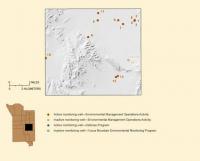-
Northcom’s first priority: “No-Fail” homeland defense
Homeland defense is the first priority of U.S. Northern Command, Navy Adm. William E. Gortney told members of the House Armed Services Committee last Thursday. Gortney named ISIS and whatever form it takes in the future, and transnational organized criminals who move drugs, people, weapons and anything else that will turn a profit as the most dangerous and likely threats to the nation.
-
-
ISIS bolsters its position in Libya by claiming to defend it against “foreign invaders”: UN

ISIS has greatly expanded its control over territory in Libya, and the Islamist militants are now claiming to be the defenders of the North African state against foreign military intervention, according to UN sanctions monitors. The number of ISIS fighters in the country is now estimated to be around 6,000.
-
-
U.K. to destroy biometric information of 45 terror suspects due to botched paperwork
British security agencies will have to destroy fingerprints and DNA of forty-five terror suspects because the police retained the biometric samples longer than the law allows. The law does allow the police to keep biometric information of terrorism suspects indefinitely, but certain paperwork must be completed within a certain period of time to allow that, and if the paperwork is not completed, the samples must be destroyed. A new report reveals that Britain holds biometric information and materials on nearly 8,000 suspects.
-
-
U.S. captures head of ISIS chem weapons unit; targets ISIS chem weapons infrastructure

U.S. Special Forces operating in Iraq captured the head ISIS chemical weapons unit. Sleiman Daud al-Afari, who worked for Saddam Hussenin’s now-disbanded Military Industrialization Authority where he specialized in chemical and biological weapons, was captured during a raid near the northern Iraqi town of Tal Afar last month.American and Iraqi officials say that there are many indications that ISIS is working hard to develop chemical weapons.
-
-
Trump’s campaign rhetoric, ISIS and the law of war
Presidential candidate Donald Trump said that one reason the U.S. war against ISIS is “ineffective” is that “We’re fighting a very politically correct war.” Exactly what Trump is suggesting doing is not clear, but it is significant that Trump recently acknowledged that the U.S.“is bound by laws and treaties” and that as president he would “not order a military officer to disobey the law.” Instead, he said he would “seek [the] advice” of military and other officials. This is good news, and something all the candidates – and their critics – ought to embrace, as applying the law of war in the twenty-first century is much more complicated than many think. Words do matter, and where the nation’s security is concerned, no words can be more important..
-
-
State-level immigration policies should be subject of cost-benefit analysis
While immigration policy has been the purview of the U.S. federal government, nearly all states have taken a more-active role on the issue of unauthorized immigration in the past fifteen years through actions such as making drivers licenses available regardless of immigration status and requiring employers to verify eligibility to work, according to a new study. States, however, rarely examine the costs and benefits of such policies before enacting them, suggesting the need for a comprehensive tool to help state policymakers assess the full range of costs and benefits of immigration policies before they are adopted.
-
-
Senior ISIS leader Abu Omar al-Shishani killed in U.S. strike

Abu Omar al-Shishani, a Syrian-based Georgian national who was a senior ISIS leader, was killed in a 4 March air strike by the U.S.-led coalition. U.S. officials said that the militant was killed near the Syrian town of al-Shadad. He had a reputation as a close military adviser to ISIS’s leader Abu Bakr al-Baghdadi, who relied heavily on Shishani.
-
-
ISIS plotted to kidnap Malaysia’s prime minister, other high officials
Ahmad Zahid Hamidi, Malaysia’s deputy prime minister, said Malaysia had foiled a plot by ISIS to kidnap government leaders, including the country’s prime minister. Hamidi to say that jihadists attempted to kidnap him and two other Malaysian officials — including the prime minister Najib Razak and the defense minister, Hishammuddin Hussein.
-
-
Secretive Area 6 used to test aerial radiation detection equipment

Top-secret Nevada site – even more secret than neighboring Area 51 — is used by Pentagon, DHS to test drones equipped with sensors to detect radioactive material which could be used in dirty bombs. The site, located in Yucca Flat, was once used for nuclear testing.
-
-
U.S. air strikes kills 150 al-Shabaab militants in Somalia

Strikes by U.S. drone ad manned aircraft has killed 150 al-Shabaab fighters in Somalia, the Pentagon said on Monday. The strikes were conducted on Saturday against the Raso Camp, 120 miles north of Mogadishu, where the al-Qaeda-affiliated Islamist group built a training facility.
-
-
ISIS hackers post N.J. police officers’ details online, calling on followers to attack them

ISIS hackers have posted the personal details of U.S. officials online, encouraging the group’s supporters to carry out “lone wolf” attacks against them. The Caliphate Cyber Army (CCA), formerly known as the Islamic Cyber Army, posted the personal details of fifty-five New Jersey police officers last week after hacking into the Web site of the New Jersey Transit police.
-
-
The staggering cost of war to Syria, neighbors

A new report evaluates the economic losses to Syria, Lebanon, Jordan, and Turkey to date and into the future. The report concludes that the cost of conflict to Syria is an estimated $275 billion in lost growth opportunities. If the conflict continues to 2020, the cost of conflict to Syria will be $1.3 trillion.
-
-
Calif. terrorists’ iPhone may have been used to introduce malware into data networks: DA

San Bernardino County District Attorney Michael Ramos has advanced what experts describe as an unusual reason for forcing Apple to allow the FBI to break the password of the iPhone used by the two terrorists as part of the agency’s investigation of the attack. Ramos says the phone might have been “used as a weapon” to introduce malicious software to county computer systems.
-
-
Dissident republicans’ weapons cache discovered in Northern Ireland
Police Service of Northern Ireland (PSNI) has discovered a terrorist weapons cache in a forest park in Northern Ireland. Police have been warning for a whole that dissidents republicans were planning to ramp up violence in the run-up to the centenary of the 1916 Easter Rising against British rule in Dublin.
-
-
Four African innovators selected for engineering innovation prize
Following an open, competitive, application process which saw entries from fifteen countries in sub-Saharan Africa, twelve African entrepreneurs were chosen to receive a package of six months of business training and mentoring from the U.K.’s Royal Academy of Engineering. The four finalists showing the greatest promise have now been chosen, and are in with a chance to become the overall winner. Each will receive at least £10,000 with the grand prize of £25,000 to be awarded at a ceremony in Cape Town on 1 June. A low-cost sustainable water filter system to provide clean and safe drinking water, and a service that allows African mobile phone users to switch easily between multiple mobile networks are among the four African innovations selected by the Academy.
-
More headlines
The long view
Kinetic Operations Bring Authoritarian Violence to Democratic Streets
Foreign interference in democracies has a multifaceted toolkit. In addition to information manipulation, the tactical tools authoritarian actors use to undermine democracy include cyber operations, economic coercion, malign finance, and civil society subversion.
Patriots’ Day: How Far-Right Groups Hijack History and Patriotic Symbols to Advance Their Cause, According to an Expert on Extremism
Extremist groups have attempted to change the meaning of freedom and liberty embedded in Patriots’ Day — a commemoration of the battles of Lexington and Concord – to serve their far-right rhetoric, recruitment, and radicalization. Understanding how patriotic symbols can be exploited offers important insights into how historical narratives may be manipulated, potentially leading to harmful consequences in American society.
Trump Aims to Shut Down State Climate Policies
President Donald Trump has launched an all-out legal attack on states’ authority to set climate change policy. Climate-focused state leaders say his administration has no legal basis to unravel their efforts.
Vaccine Integrity Project Says New FDA Rules on COVID-19 Vaccines Show Lack of Consensus, Clarity
Sidestepping both the FDA’s own Vaccines and Related Biological Products Advisory Committee and the CDC’s Advisory Committee on Immunization Practices (ACIP), two Trump-appointed FDA leaders penned an opinion piece in the New England Journal of Medicine to announce new, more restrictive, COVID-19 vaccine recommendations. Critics say that not seeking broad input into the new policy, which would help FDA to understand its implications, feasibility, and the potential for unintended consequences, amounts to policy by proclamation.
Twenty-One Things That Are True in Los Angeles
To understand the dangers inherent in deploying the California National Guard – over the strenuous objections of the California governor – and active-duty Marines to deal with anti-ICE protesters, we should remind ourselves of a few elementary truths, writes Benjamin Wittes. Among these truths: “Not all lawful exercises of authority are wise, prudent, or smart”; “Not all crimes require a federal response”; “Avoiding tragic and unnecessary confrontations is generally desirable”; and “It is thus unwise, imprudent, and stupid to take actions for performative reasons that one might reasonably anticipate would increase the risks of such confrontations.”
Luigi Mangione and the Making of a ‘Terrorist’
Discretion is crucial to the American tradition of criminal law, Jacob Ware and Ania Zolyniak write, noting that “lawmakers enact broader statutes to empower prosecutors to pursue justice while entrusting that they will stay within the confines of their authority and screen out the inevitable “absurd” cases that may arise.” Discretion is also vital to maintaining the legitimacy of the legal system. In the prosecution’s case against Luigi Mangione, they charge, “That discretion was abused.”
